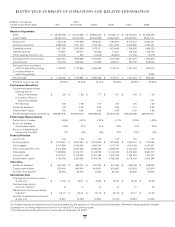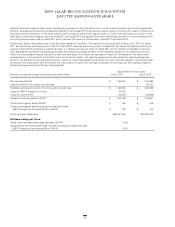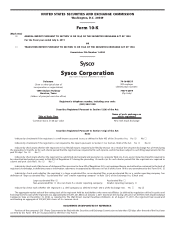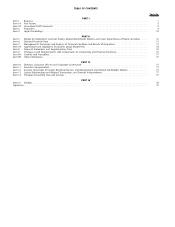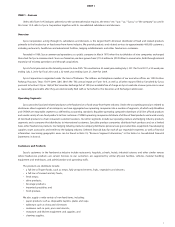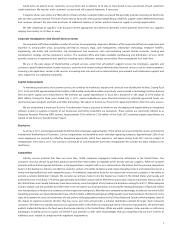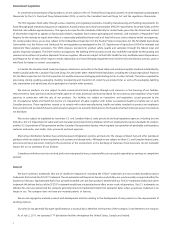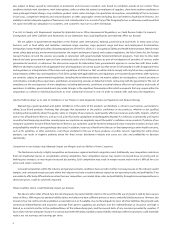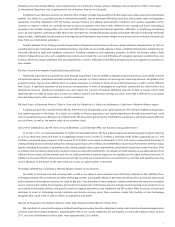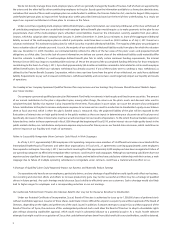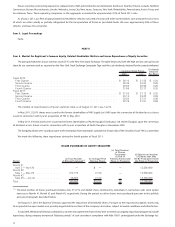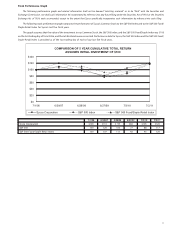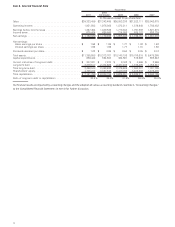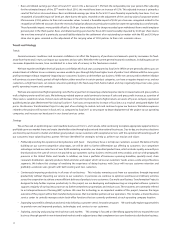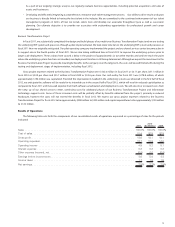Sysco 2011 Annual Report Download - page 29
Download and view the complete annual report
Please find page 29 of the 2011 Sysco annual report below. You can navigate through the pages in the report by either clicking on the pages listed below, or by using the keyword search tool below to find specific information within the annual report.Item 1A. Risk Factors
Periods of Difficult Economic Conditions and Heightened Uncertainty in the Financial Markets Affect Consumer Confidence, which Can Adversely
Impact our Business
The foodservice distribution industry is characterized by relatively high inventory turnover with relatively low profit margins and the
foodservice industry is sensitive to national and regional economic conditions. Difficult economic conditions, such as the slow economic recovery
experienced in fiscal 2011 which included food and fuel cost inflation experienced by the consumer, and heightened uncertainty in the financial
markets negatively affect consumer confidence and discretionary spending. This can lead to reductions in the frequency of dining out and the
amount spent by consumers for food-away-from-home purchases. These conditions, in turn, can negatively impacted our sales. The development
of worsening economic conditions in the future or permanent changes in consumer dining habits as a result of such conditions would likely
negatively impact our operating results.
Periods of Significant or Prolonged Inflation or Deflation Affect our Product Costs and Profitability
Volatile food costs have a direct impact on our industry. Periods of product cost inflation may have a negative impact on our profit margins
and earnings to the extent that we are unable to pass on all or a portion of such product cost increases to our customers, which may have a
negative impact on our business and our profitability. In addition, product cost inflation may negatively impact consumer spending decisions,
which could adversely impact our sales. Conversely, our business may be adversely impacted by periods of product cost deflation because we
make a significant portion of our sales at prices that are based on the cost of products we sell plus a percentage markup. As a result, our profit
levels may be negatively impacted during periods of product cost deflation, even though our gross profit percentage may remain relatively
constant. Our estimate for the inflation in Sysco’s cost of goods was 4.6% in fiscal 2011, compared to deflation of 1.5% in fiscal 2010 and inflation of
4.7% in fiscal 2009.
Our Business Transformation Project Could Experience Implementation Problems, Scheduling Delays or Cost Overages and May Not Prove to Be
Cost Effective or Result in the Benefits We Anticipate, Negatively Impacting our Business, Results of Operations and Liquidity
In fiscal 2009, we commenced the design of an enterprise-wide project to implement an integrated software system, commonly referred to as
an Enterprise Resource Planning (ERP) system, to support a majority of our business processes and further streamline our operations. We have
substantially completed the design and build phases of our Business Transformation Project and we are testing the underlying ERP system and
processes through a pilot implementation. During the fourth quarter of fiscal 2011, our pilot operating company implemented the project and our
shared services center became active in its support role. ERP implementations are complex and time-consuming projects that involve substantial
investments in system software and implementation activities over a multi-year timeframe. As is the case in most ERP implementations, we expect
that the implementation of our ERP system will require transformation of business and financial processes in order to realize the full benefits of the
project. Although we expect the investment in the Business Transformation Project to provide meaningful benefits to the company over the long-
term, the costs will exceed the benefits during the testing and deployment stages of implementation, including fiscal 2012. The expected costs of
the project in fiscal 2012 may be greater or less than currently expected because as we continue implementation of the project, we may encounter
the need for changes in design or revisions of the project calendar and budget, including incurring expenses at an earlier or later time than
currently anticipated. In fiscal 2011, we took more time to test the underlying ERP system and processes. We are also taking additional time in fiscal
2012 to improve the underlying systems prior to larger scale deployment. These actions have caused a delay in the project of approximately six to
twelve months and until we reach the point where the underlying system functions as intended, our deployment timeline is still being
determined. Our business and results of operations may be adversely affected if we experience operating problems, scheduling delays, cost
overages or limitations on the extent of the business transformation during the ERP implementation process. In addition, because the
implementation is expected to involve a significant capital commitment, our business, results of operations and liquidity may also be adversely
affected if the ERP system, and the associated process changes, do not prove to be cost effective or do not result in the cost savings and other
benefits that we anticipate.
We May Not Be Able to Fully Compensate for Increases in Fuel Costs
Volatile fuel prices have a direct impact on our industry. The cost of fuel affects the price paid by us for products as well as the costs incurred
by us to deliver products to our customers. Although we have been able to pass along a portion of increased fuel costs to our customers in the
past, there is no guarantee that we can do so again if another period of high fuel costs occurs. If fuel costs increase again in the future, we may
experience difficulties in passing all or a portion of these costs along to our customers, which may have a negative impact on our business and our
profitability. We routinely enter into forward purchase commitments for a portion of our projected monthly diesel fuel requirements at prices
equal to the then-current market price for diesel. If fuel prices decrease significantly, these forward purchases may prove ineffective and result in
us paying higher than market costs for a portion of our diesel fuel.
Conditions Beyond our Control can Interrupt our Supplies and Increase our Product Costs
We obtain substantially all of our foodservice and related products from third party suppliers. For the most part, we do not have long-term
contracts with our suppliers committing them to provide products to us. Although our purchasing volume can provide leverage when dealing
with suppliers, suppliers may not provide the foodservice products and supplies needed by us in the quantities and at the prices requested. We are
5



